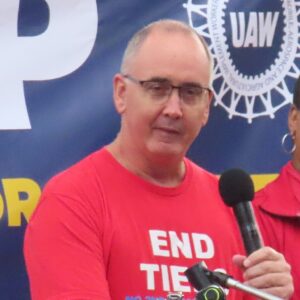An “Eat the Rich” T-shirt is the sort of symbolism most often found at progressive campus protests or rallies of the Democratic Socialists of America (DSA). So why was it worn at a recent public appearance by Shawn Fain, the head of the United Auto Workers union, and what does that choice tell us about the inner circle of the man leading the most aggressive UAW strike in generations?
Those are some of the questions critics are asking as they see continued economic fallout from a strike with no end in sight, seemingly powered by the radicalization of the UAW’s leadership led by Fain and his closest advisers, which contains self-avowed Marxists and ideologues so extreme they are defending Hamas terrorists.
Fain has made no secret of his “social justice” politics. Rather than focusing on benefits and pay for his union’s members, he’s pushing his union to enter the broader political fray.
“The UAW is back in the fight and we are ready to stand united to win economic and social justice,” Fain said in a Labor Day speech. “And I got a question for all of you. Are you ready to rumble?”
Many union members are more than happy to “rumble” on behalf of better pay and shorter working hours, but are members of a traditionally blue-collar, midwestern manufacturing union comfortable with the extreme language of the Ivory Tower ideologues orchestrating their strike and managing their checkbooks?
Interestingly, one of Fain’s closest advisers at the UAW today is Chris Brooks. Until recently, Brooks was a member of the New York DSA, which supported an anti-Israel rally the day after Hamas’ horrific slaughter of 1,400 innocent Israelis.
Even America’s most famous New York City socialist, Alexandria Ocasio-Cortez, denounced the rally and the rhetoric heard at it as “abhorrent and morally repugnant.”
Brooks was even part of the national DSA’s openly Marxist Bread & Roses caucus, which self-describes itself as “militant.” The group is so extreme that its mission statement includes ending “the Democratic Party’s chokehold on progressive politics.” The group has a whole section on “internationalism” in its manifesto — but only specifically points to its alignment with “the Palestinian struggle against Israeli apartheid” and “support for the (Boycott, Divestment, Sanctions) movement.”
Its message the day after Hamas’ mass murder?
“All people have the right to resist occupation. We offer full solidarity to the Palestinian resistance. There’s no freedom for the working class of any country without freedom for Palestine.”
It doesn’t stop there. Benjamin Dictor, counsel to the UAW and others across the country, has been aggressive online, writing that “trade unionists, people who dedicate their lives to working people and the oppressed, have a moral obligation to stand up and condemn the ethnic cleansing of millions of imprisoned and oppressed Palestinians at the hands of Israel.”
Dictor has frequently opined on the conflict on Twitter but has reserved his condemnations only to Israel’s response to the attack, with no commentary on Hamas. That did not stop Fain from openly collaborating with him last week.
Rhetoric like this would once be surprising for the UAW, but no longer: As journalist Jane Slaughter noted, Fain’s leadership at the UAW owes itself to radical DSA activism: “There are a lot of DSA members, not only in Detroit, but elsewhere working their butts off in an electoral campaign within their union to get Shawn Fain elected president of the union.”
Fain has even stood by his radical advisers despite intense criticism from long-standing UAW members and leaders.
After Fain fired his previously chosen chief of staff Joe Rioux, Rioux warned in a February 2023 memo to Fain that he and other fired leaders had concerns about Brooks’ influence over Fain, including Brooks’ “lack of transparency, his need for control over departmental discussions, his need to control access to you, and his apparent lack of ability to work in a real collaborative manner.”
The following month, pro-union publication Left Horizons criticized Fain for firing Rioux and senior staff while “turning to those trendy ‘labour consultants’ for guidance, in this case, Chris Brooks.” The publication also chastised Brooks for previously using rhetoric that “lets the culprits at the top off the hook, blaming the members,” for issues that stemmed from management.
Brooks has also been accused of racial insensitivity and minimizing the work of Black labor activists. These include angering prominent activists in the Chattanooga area in 2013 and during the 2020 Black Lives Matter demonstrations when Brooks wrote an article that was viewed as a “racist belittling of the accomplishment of black workers in the labor movement.” More recently, Brooks allegedly declined to meet with several Black and Brown activists willing to support Fain.
Fain won an extremely close election for UAW president because he ran primarily on a promise to fight the union’s famous corruption, not because he championed politics so extreme they turned Ocasio-Cortez’s stomach.
With more than 6,000 auto workers now laid off by the Big Three, tens of thousands more on strike, and billions of economic losses already tallied, it is fair to wonder if the UAW rank-and-file will continue to stand by their new president and his extreme cadre of advisers who are seemingly driven by ideology, not member interest.

